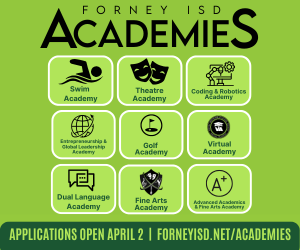Forney, TX - North Forney High School graduate Jaden Rankin is a senior biology major at The University of Texas at Arlington who recently received an award to showcase her original research at Entomology 2024.
Forney, TX - North Forney High School graduate Jaden Rankin is a senior biology major at The University of Texas at Arlington who recently received an award to showcase her original research at Entomology 2024.
“Attending Entomology 2024 last November allowed me to learn more about the field of insect research,” she said. “It was my first major research symposium, and it was so incredibly exciting to meet people at all levels of education."
After graduation, Jaden plans to pursue her Ph.D. and work in a national park. Read more here about Jaden's research.
More about the Program
Aerospace engineering senior Philip Wilson attended an American Institute of Aeronautics and Astronautics (AIAA) conference. Rohit Raut, a senior physics major, presented his work at a nuclear research symposium, and senior biology major Jaden Rankin had the opportunity to feature her research at an entomology conference.
These and other University of Texas at Arlington students were able to showcase their original research at major symposiums thanks to UTA’s expansion of its popular undergraduate research program that provides funding for select students to present at academic conferences.
“At the conference, I presented my work on rotating detonating engine nozzles to students from other universities, professors, and other AIAA members,” said Wilson, who along with his partner, Khushi Piparava, presented their work and won second place among student presenters. “I got to see the research and work done by my peers at other universities, and it solidified my plans to stay on at UTA and pursue my Ph.D. in aerospace engineering.”
The initial expansion of this program supported eight students, each receiving up to $1,000 based on the costs of attending a symposium.
“We’re allowing a select group of students to showcase their original research at international conferences, which allows students to network with future collaborators, talk to possible employers, and experience firsthand what it’s like to be an established researcher,” said Kayunta Johnson-Winters, director of undergraduate research at UTA and an associate professor of chemistry and biochemistry. “The response from the students and their faculty advisors has been so encouraging.”
The program enabled Raut, an aspiring physicist, to attend a meeting at CERN, the European Organization of Nuclear Research.
“As a physicist and a researcher, it’s always exciting to be at CERN,” Raut said. “You never know if the person standing next to you in the lunch line is the physicist who inspired you to pursue physics.”
Rankin attended Entomology 2024 in Phoenix, and she noted that her experience in the program has strengthened her commitment to pursuing graduate studies in biology.
“Attending Entomology 2024 last November allowed me to learn more about the field of insect research,” she reiterated. “It was my first major research symposium, and it was so incredibly exciting to meet people at all levels of education. I plan to pursue a Ph.D. and possibly work in a national park after I finish my studies.”
Other students from UTA also had remarkable experiences. Ben Gervasi attended the Midwest Art History Society Conference in Chicago, while Ken Perry presented research on the connection between high-fat meals and cardiovascular health at the American Physiological Society meeting, receiving two significant awards for his presentation.
“The first award was given to about 100 people, but the second was more of a competition meant to honor the top 10 undergraduates at the entire conference, which had over 20,000 people,” Perry said. “It was really a huge honor for me.”
Gervasi, a senior art history major, called his opportunity to attend the Midwest Art History Society Conference an “amazing opportunity to network with experts in the field.” After earning his degree this spring, he plans to attend graduate school to further his study of late-19th-century French art. Eventually, he hopes to teach at the university level.
“Research is not confined to the papers you write,” Gervasi said. “The events you attend and the places you explore naturally inspire your research and keep it fresh.”








